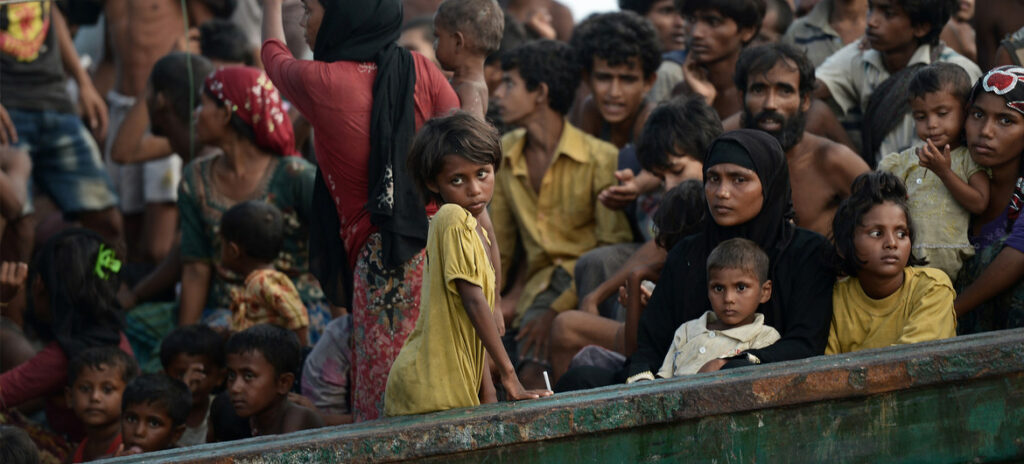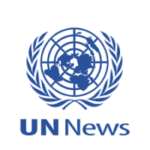Amid COVID-19 Pandemic, Thousands Stranded in Bay of Bengal ‘Unable to Come Ashore’
HUMAN RIGHTS, 11 May 2020
UN News - TRANSCEND Media Service
6 May 2020 – In the midst of the COVID-19 pandemic, United Nations agencies called today for South-East Asian governments to show compassion to boats full of vulnerable people adrift in the Bay of Bengal and Andaman Sea.
The International Organization for Migration (IOM), the Office of the High Commissioner for Refugees (UNHCR) and the UN Office on Drugs and Crime (UNODC) said that thousands of lives may be at stake if the stranded people are unable to disembark.
Those at sea include hundreds of Rohingya, ethnic communities from Western Myanmar who faced persecution that was likened to ethnic cleansing by former top UN rights official Zeid Ra’ad Al Hussein.
"We are deeply concerned by reports that boats full of vulnerable women, men and children are unable to come ashore."@UNmigration @UNODC and @Refugees call for greater protection of #Rohingya currently at seahttps://t.co/SFcKndGMSf pic.twitter.com/FKsB0Q0A22
— Jeff Labovitz (@labovitz) May 6, 2020
“We are deeply concerned by reports that boats full of vulnerable women, men and children are again adrift in the same waters, unable to come ashore, and without access to urgently needed food, water, and medical assistance”, the three UN agencies spelled out.
The development comes five years after a similar crisis in the Bay of Bengal and Andaman Sea, when thousands of refugees and migrants were cut adrift by people-traffickers.
UN offers support
In a call for a regional solution to the latest emergency, the three UN agencies offered their support to States across the region to provide immediate assistance to asylum-seekers, refugees and vulnerable migrants, and also to help strengthen their ability to respond to irregular movements of people.
Some States had “already demonstrated that health screening and quarantine arrangements can be implemented so that people can disembark in a safe, orderly and dignified manner”, the UN agencies said in a joint statement.
Although there was “no easy solution” to irregular maritime movements of refugees and migrants, the UN appeal insisted that “deterring movements of people by endangering life” was ineffective and violated basic human rights, the law of the sea and international law “by which all States are equally bound”.
Saving lives must be the first priority, the agencies maintained, stressing that when people are in search of safety, protection or basic survival, they will move regardless of any obstacles in their path.
“We recognize that in the midst of the COVID-19 pandemic, States have erected border management measures to manage risks to public health”, the joint statement said. “These measures…should not result in the closure of avenues to asylum, or in forcing people to either return to situations of danger or seek to land clandestinely, without health screening or quarantine”.

Stranded Rohingya people sit on the deck of an abandoned smugglers’ boat drifting in the Andaman Sea.
UNHCR/Christophe Archambault
Left adrift at sea
After the 2015 crisis, UNHCR issued a report containing testimonies of survivors who detailed long and difficult journeys at the hands of smugglers.
They also claimed to have been towed or guided on many occasions by authorities “from one territorial water to another”.
At least 5,000 people were abandoned en masse by smugglers at sea five years ago; they eventually disembarked in Bangladesh, Indonesia, Malaysia, Myanmar and Thailand.
And boat crews cited starvation, dehydration, disease and abuse as the main causes for the 70 who died then, UNHCR said.
At the time, the UN refugee agency warned of a reported “bottleneck” that was keeping thousands of people at sea on large holding ships, which, in the face of increased scrutiny by authorities, was believed to be owing to smugglers’ inability to disembark passengers to Thailand or Malaysia.
Such holding ships were said to be steel-hulled vessels with eight or more levels that each held over 1,000 passengers.
Tags: Asia, Aung San Suu Kyi, Bangladesh, Buddhism, Burma/Myanmar, Cultural violence, Direct violence, Ethnic Cleansing, Free Rohingya Coalition, Genocide, History, Human Rights, International Court of Justice ICJ, Justice, Maung Zarni, Racism, Religion, Rohingya, Social justice, Structural violence, United Nations
DISCLAIMER: The statements, views and opinions expressed in pieces republished here are solely those of the authors and do not necessarily represent those of TMS. In accordance with title 17 U.S.C. section 107, this material is distributed without profit to those who have expressed a prior interest in receiving the included information for research and educational purposes. TMS has no affiliation whatsoever with the originator of this article nor is TMS endorsed or sponsored by the originator. “GO TO ORIGINAL” links are provided as a convenience to our readers and allow for verification of authenticity. However, as originating pages are often updated by their originating host sites, the versions posted may not match the versions our readers view when clicking the “GO TO ORIGINAL” links. This site contains copyrighted material the use of which has not always been specifically authorized by the copyright owner. We are making such material available in our efforts to advance understanding of environmental, political, human rights, economic, democracy, scientific, and social justice issues, etc. We believe this constitutes a ‘fair use’ of any such copyrighted material as provided for in section 107 of the US Copyright Law. In accordance with Title 17 U.S.C. Section 107, the material on this site is distributed without profit to those who have expressed a prior interest in receiving the included information for research and educational purposes. For more information go to: http://www.law.cornell.edu/uscode/17/107.shtml. If you wish to use copyrighted material from this site for purposes of your own that go beyond ‘fair use’, you must obtain permission from the copyright owner.

This reminds me of just over 15 years ago when the terrible tsunami killed over 250,000 people in one day Dec 26, 2004. This is as many as all the COVID-19 deaths in the last four months, but most of these are in the white, European countries whereas few of the deaths in the tsunami were from these places. Perhaps this is why there is little outcry now from the rich and powerful who also did not notice the millions dead in the DRC in recent decades.